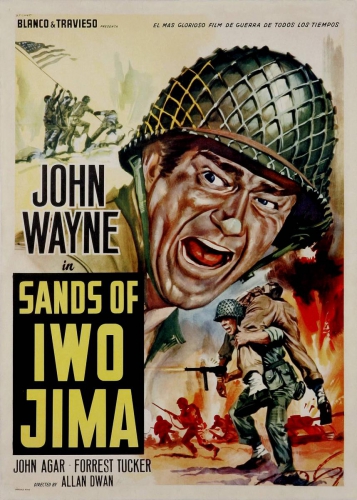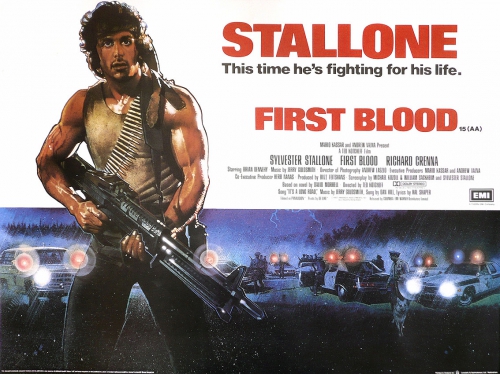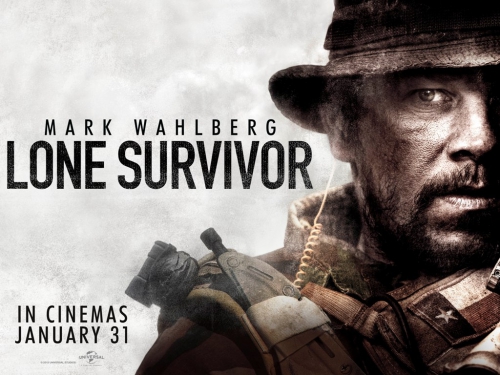lundi, 24 mars 2025
Quand Hollywood fait la chasse au comte Zaroff
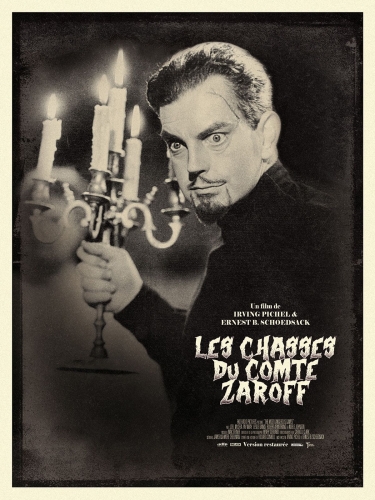
Quand Hollywood fait la chasse au comte Zaroff
Nicolas Bonnal
J’ai repris ma version de 2016 pour établir ce texte, dont j’avais écrit une première version bien avant. Je reconnais qu’en matière de russophobie, depuis, l’élève européen a dépassé le maître (l’Amérique, toujours, plus russophile avec les républicains pour des raisons établies par Todd)….
Je crois de plus en plus à une montée de la tension russo-américaine pour l’année prochaine, qui pourrait déboucher sur une catastrophe. C’est comme pour les produits dérivés ; on ne s’arrêtera pas en si bon chemin, et c’est Hollywood qui va nous éclairer à ce propos.

Dans les années 80 et 90, Hollywood envoyait Schwarzenegger égorger des latinos en Amérique centrale ou du sud (Commando, Predator, Collateral Damage) ; ou bien, quand on avait moins d’argent, on envoyait Chuck Norris. Dans les années 90, alors que l’on prépare l’opinion aux attentats du 11 septembre et aux guerres qui s’ensuivent, on ne cesse de montrer au public des films consacrés au terrorisme islamiste. Enfin, dans les années trente, pour remonter le cours du temps, les épisodes de Buck Rogers nous initiaient au péril jaune.
Chaque fois, des guerres ont bien eu lieu. En Asie bien sûr (Japon, Corée, Vietnam et tout le reste). En Amérique centrale, en Colombie (300.000 morts tout de même), au Moyen-Orient où elles ne cessent pas, et ne cesseront peut-être jamais. Et ce que nous voyons aujourd’hui, c’est que la pression antirusse ne cesse de monter du côté de Los Angeles.
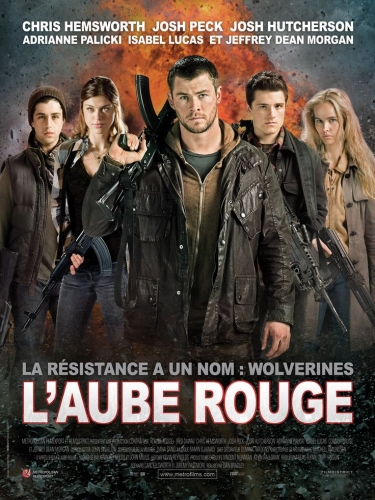
Dans les années 80, on avait eu Rambo 2 et 3, la délirante Aube rouge, qui voyait une invasion russo-cubaine des USA. L'invasion latino a bien eu lieu, mais sous forme de réfugiés économiques.
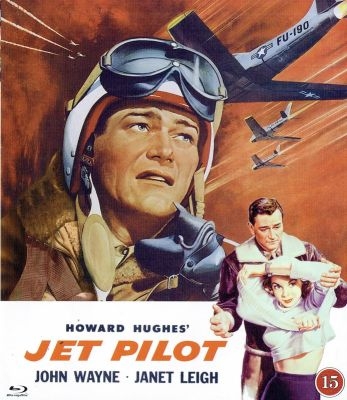
Il y a toujours eu pléthore de films antirusses à Hollywood, et il est bon de noter que ces films antirusses étaient rarement anticommunistes : sous Roosevelt le cinéma fut même pro-stalinien. Je me souviens d’une comédie, Jet Pilot, de von Sternberg, datant d’après d’ailleurs, narrant le mariage d’une belle pilote stalinienne avec John Wayne ! Sous Reagan aussi, Le Quatrième Protocole (1987), Double Détente (1988) ou Gorky Park (1983) ne marquaient pas, c’est le moins qu’on puisse dire, un anticommunisme viscéral. On peut rappeler aussi la Belle de Moscou qui voit Fred Astaire séduire Cyd Charisse avec son soft power. Et je ne cite pas Reds de Warren Beatty oscarisé en 1981 pour son catéchisme bolcheviste (c’est à croire que l’on attendait avec impatience la nationalisation de toutes les banques et de toutes les dettes…).
Les grands cinéastes anticommunistes comme Mervin Le Roy, l’immense McCarey ou même Kazan ont même été diabolisés ou sciemment oubliés depuis, à l’instar de Joe McCarthy.
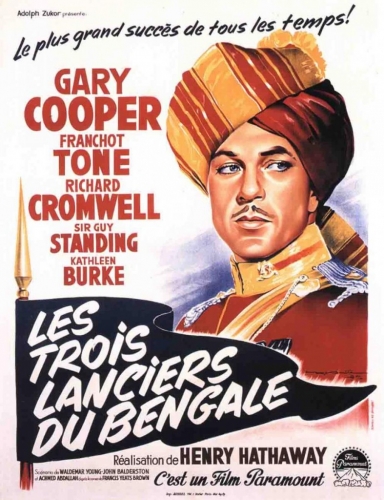
Les films hollywoodiens étaient plutôt antirusses, et marquaient une haine antirusse civilisationnelle, essentiellement tsariste et orthodoxe. L’Amérique comme l’Angleterre de Palmerston au 19ème siècle poursuivait la lutte de la périphérie océanique contre le pays-continent, que l’on symbolisait par le conflit de l’ours et de la baleine. L’Angleterre réussit à entraîner la France de Louis-Napoléon dans son irréelle guerre de Crimée (la charge de la brigade légère). Disraeli voulait une guerre contre la Russie en 1878, pour protéger l'empire ottoman, et l’obsession anglo-saxonne était d’empêcher la Russie d’avoir accès aux mers chaudes ou bien de se rapprocher des Indes (la thématique de McKinder). C’est une belle espionne russe qui aide Mohammed Khan à capturer les Trois lanciers du Bengale dans le film éponyme (par ailleurs œuvre préférée d’Adolf Hitler, qui s’y connaissait en racisme antirusse). Kim avec Errol Flynn tacle aussi la Russie (elle envahit l'Inde!). Le Kipling sur l'homme qui voulut être roi est aussi antirusse (le "grand jeu"…), mais pas la belle adaptation de John Huston. On pourra aussi citer Capitaine sans peur, de Raoul Walsh où un fougueux Gregory Peck se fait fouetter par un noble russe, dont il a séduit la fiancée... Encore un marin contre un terrien. Le film tourne autour de l'Alaska que le tsar Alexandre II vendit pour une bouchée de pain. Et dire qu'Alexandre aurait pu aider l'Angleterre et la France impériale à soutenir le Sud sécessionniste…
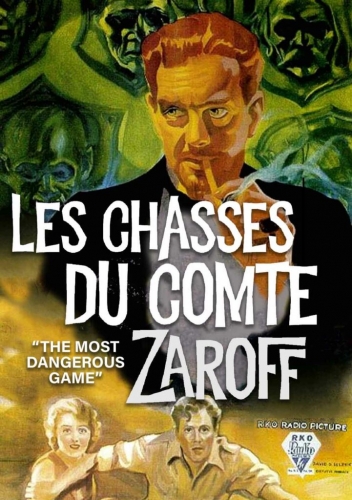
Mais c’est le légendaire comte Zaroff (avatar de King Kong finalement) qui synthétise tous les préjugés antirusses : c’est évidemment un russe blanc, un aristocrate ; il adore chasser ; il est cruel et entouré de moujiks sordides ; et il se lance dans des chasses sadiques après avoir coulé les navires des riches yachtmen qui croisent près de son île mélanésienne. Rappelons qu’Hollywood ne dénoncera presque jamais le bolchévisme : McCarthy a essayé d’expliquer pourquoi, on a vu comment il a fini dans la fosse à purin, plus bas qu’Hitler ou presque.
Trente ans plus tard, Kubrick le russophile (voyez mon livre sur Kubrick aux éditions Dualpha) se moque un peu du racisme antirusse dans son Docteur Folamour : pour le général xénophobe qui pousse le président à une guerre totale, les Russes sont un « tas de moujiks ignorants ». Mais l’ambassadeur soviétique ne s’illustre pas par sa bonne conduite dans la War Room où il ne faut pas se battre... Dans 2001 les savants russes sont du reste des savants trompés par une conspiration américaine !
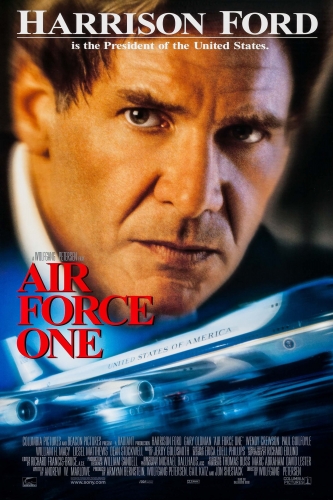
Comme je l’ai dit déjà, il y eut une baisse de régime antirusse sous le regretté Ronald Reagan : les républicains sont devenus moins hostiles aux Russes depuis Nixon que les démocrates, ce n’est pas difficile... Et puis l’implosion du communisme, mauvais service rendu aux Anglo-Saxons (il a libéré les forces vives de la Chine, de la Russie et même de l’Inde), fait qu’en 1997 Simon Templar alias Le Saint va combattre un « oligarque ultranationaliste » qui risque de nous priver de pétrole et de liberté. A la même époque les oligarques apatrides enrichis sous l'ère Eltsine sont déjà tous à Londres ou à Megève... La même année Air Force One nous décrit l’assaut de l’avion présidentiel américain par un groupe de terroristes nationalistes. Le sulfureux Gary Oldman peut exposer son point de vue de méchant, d’ailleurs parfaitement justifié.
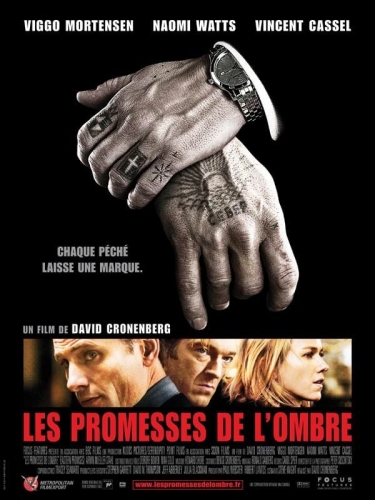
Il faut attendre dix ans pour voir une nuée de films antirusses déferler sur nos écrans : Les Promesses de l’Ombre, de Cronenberg, La Nuit nous appartient, X-Files de Chris Carter. La russophobie revient avec le regain russe, comme le dit Todd dans son Après l'Empire. A chaque fois, on n’y va pas de main morte : les Russes sont des cannibales, des racistes abrutis, des trafiquants de cocaïne, ou des mafieux pathétiques qui contrôlent tout ce qui se fait du mal dans le monde (Equalizer)... Pis encore, ils vont aussi à l’église et ont l’esprit de famille...
C’est eux, et non pas d’autres, qui organisent la nouvelle traite des blanches. On se croirait au temps du terrible Ivan Grozny !
Menacent-ils la sécurité des Etats-Unis, qui aujourd’hui peut être menacée n’importe où ? Oui, pour Charlie’s Wars, écrit par Aaron Sorkin et réalisé l’an dernier par Mike Nichols, qui montre comment les Etats-Unis ont équipé les talibans pour abattre les hélicoptères de l’armée rouge. S’agit-il d’une répétition ?
La russophobie en Amérique est ancienne. On demandera à Tocqueville de la justifier, ce qu'il fait nûment à la fin du tome premier de sa Démocratie :
« Il y a aujourd'hui sur la terre deux grands peuples qui, partis de points différents, semblent s'avancer vers le même but: ce sont les Russes et les Anglo-Américains. Tous deux ont grandi dans l'obscurité; et tandis que les regards des hommes étaient occupés ailleurs, ils se sont placés tout à coup au premier rang des nations, et le monde a appris presque en même temps leur naissance et leur grandeur. »
Sources :
https://www.dedefensa.org/article/emmanuel-todd-et-le-con...
https://www.dedefensa.org/article/kubrick-et-la-question-...
https://www.dedefensa.org/article/kubrick-et-la-demence-d...
https://www.dedefensa.org/article/kubrick-et-polanski-con...
https://www.revuemethode.org/sf111630.html
12:13 Publié dans Cinéma, Film | Lien permanent | Commentaires (0) | Tags : nicolas bonnal, cinéma, cinéma américain, hollywood |  |
|  del.icio.us |
del.icio.us |  |
|  Digg |
Digg | ![]() Facebook
Facebook
jeudi, 15 décembre 2022
Hollywood et la théorie de la conspiration
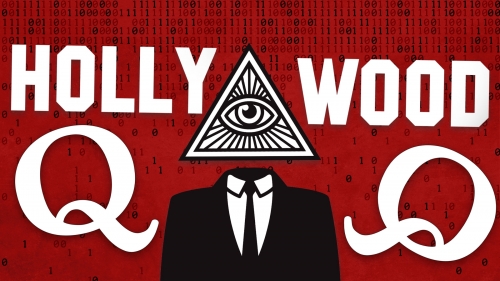
Hollywood et la théorie de la conspiration
Nicolas Bonnal
Certains pensent qu’Hollywood est une des simples agences de notre bon Etat profond US. On sait par exemple que la CIA a imposé dans le monde les musées actuels et l’expressionnisme abstrait, bref toute l’entropie artistique contemporaine. Les patrons de la CIA sont ces « fils à papa sortis de l’Ivy League » (Manfred Holler) qui ont toujours géré au mieux les intérêts financiers et les collections d’art des familles à Wall Street ; d’autre part les grandes stars (Fred Astaire, John Wayne, James Stewart) ont toujours accompagné l’agenda impérial américain. On sait aussi que l’Exorciste de Friedkin fut produit et écrit par William Peter Blatty (CIA officiel) et servait un objectif de reprise en main des populations en Occident ; il servit peut-être aussi à justifier la campagne globale d’avortement et la triple guerre contre le pauvre Irak (revoyez l'effrayant début dans cette perspective).
D’autres pensent au contraire qu’Hollywood, comme la presse, sert la liberté et dénonce les excès du gouvernement et des sévices secrets ! Serge de Beketch me disait que là se trouvait la combine: une série comme X-Files pouvait servir des agendas gouvernementaux bien précis, comme par exemple de déconsidérer les théories de ceux qui doutent. On dénonce bêtement ou excessivement tels excès – et la brave dénonciation s’annule d'elle-même. Un épisode de Deux fics à Miami montrait comment le gouvernement exploite le delirium extraterrestre pour monter des opérations psy et essayer de nouveaux systèmes d’armement. Les extraterrestres, c’est la guerre froide ! Un autre se moquait génialement des télévangélistes, contraints d'en rajouter pour recevoir des dons.
On va parler de huit films, car comme on sait le huit est le nombre de la CIA.
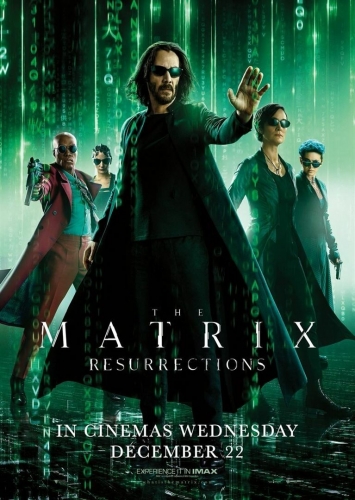
Matrix : produit pour jeunes universitaires en mal de techno-glose. C’est certainement le plus conspiratif et le plus gnostique de nos films. La réalité est un bandeau agité devant notre naseau. Mais nous préférons la mauvaise pilule à la bonne. C’est que le monde décrété vrai des frères Washowski (depuis mués en transsexuels) est pire que celui qu’ils veulent détruire. Voyez Matrix 2 ! A noter que le mérovingien popularisé par le da Vinci Code est venu nous saluer dans le deuxième navet pour nous rappeler combien le prieuré de Sion importe à nos élites globales. Ce qu’apprend Matrix c’est qu’on préfère la matrice à la réalité. C’est la leçon de Cypher avec son beefsteak. Voyez les idiots du village médiatique qui se rassemblent à Portmeirion pour répéter la partie d’échecs du prisonnier. Ils préfèrent la matrice de la série à la réalité du paysage ou à la fuite du personnage. Un autre beau rôle anti-christique de Keanu Reeves est bien sur l’Associé du diable, tourné dans l’appartement de Donald Trump sur Central Park.
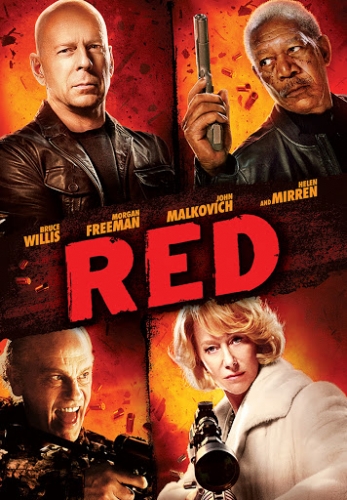
Red : film décalé et culotté, qui voit Bruce Willis parodier enfin ses rôles de sauveur du monde ! On se moque de la CIA, des Merkel de la CIA, des Macron de la CIA, on humilie le vice-président, on parodie la survie avec un tordant John Malkovitch et on réconcilie même l’Amérique et la Russie par une histoire d’amour. La suite est aussi déjantée, avec allusion à Wikileaks et aux « rock stars de la tuerie de masse conceptuelle »…
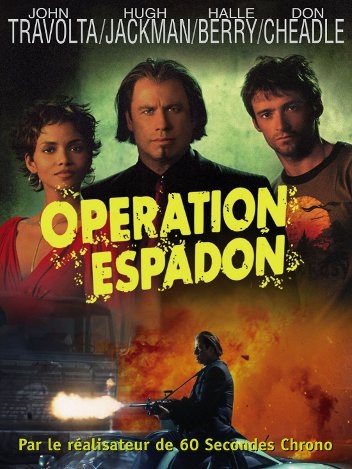
Opération espadon : je me souviens de l’article de Charlie Hebdo qui en parlait en septembre 2001. Le film de Dominic Sena, avec un John Travolta en pleine forme démontre froidement que les services secrets occidentaux débauchent les hackers et organisent eux-mêmes les attentats pour calmer leurs populations et punir tous les Irak de la planète. A transmettre à Bollyn.com ; pour Charlie c’est tard.
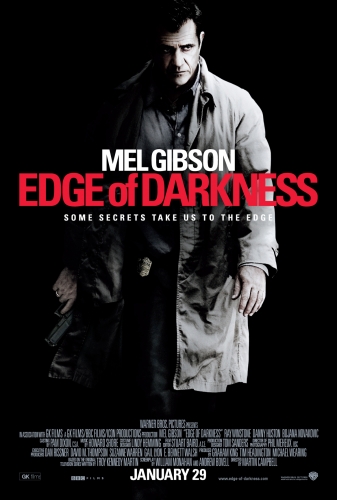
Hors de contrôle (Edge of darkness) : un bon chrétien nommé Mel Gibson venge sa fille (une actrice serbe !) martyr de l’Etat profond et aussi d’une association d’activistes écologiques. Le produit britannique est cruel et rend bien parano. Le film s’attaque moins au nucléaire qu’à ce qui le protège, les polices parallèles, la violence cryptée, les territoires interdits (nous sommes entourés de barbelés, plus que les troupeaux). Une naïve référence à la presse libre. Mais comme disait Serge de Beketch, les gens ont besoin de vaseline (il le disait à propos d’Erin Brokovitch).
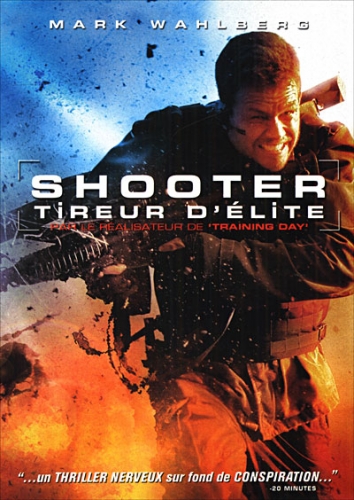
Shooter : un film très audacieux du talentueux cinéaste black Antoine Fuqua. Un sniper piégé par l’Etat profond (il est un patsie, comme le pauvre Oswald) se venge et massacre tout son monde, l’US sénateur compris. Comme dit Fuqua, le bon gros panel a préféré cette fin - on lui en proposait une moins vengeresse. Le FBI y est présenté comme une gentille et professionnelle agence luttant (avec le NYT ?) contre les pourris de notre Etat profond.
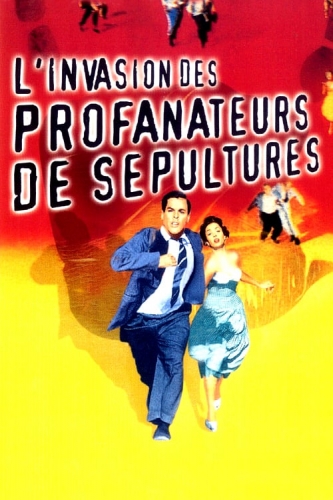
L’invasion des profanateurs de sépulture : grand classique des années cinquante censé critiquer l’anticommunisme de Forrestal selon Oliver Stone ! Je ne suis pas d’accord (en plus Forrestal fut décrété fou et liquidé). Le film explique justement que les êtres humains renaissent comme alias avec des pods ; comme vous avec votre portable, avec votre personnalité électronique et tout le reste. Le body snatcher ? Un connecté, dépossédé de lui.
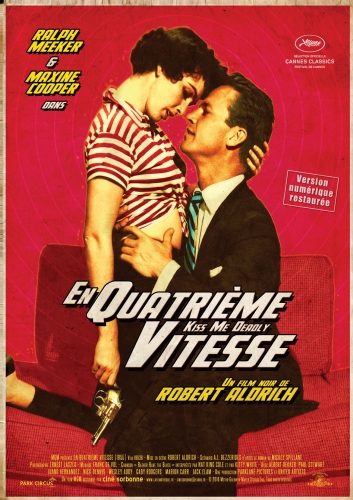
En quatrième vitesse : le classique des classiques, ma première critique de cinéma à l’Idiot international. Le meilleur film noir du cinéma américain, tourné aussi sur l’Etat profond, le nucléaire, la peur du nucléaire, l’art contemporain, le FBI et toute leur panoplie. Le réalisateur est Robert Aldrich, propre neveu du sénateur-fondateur de la Fed marié à une fille Rockefeller. On rappelle que la Fed fut créée en 1913 pour financer la guerre l’année suivante. Le cas Aldrich montre que le serpent de la connaissance se mord la queue.
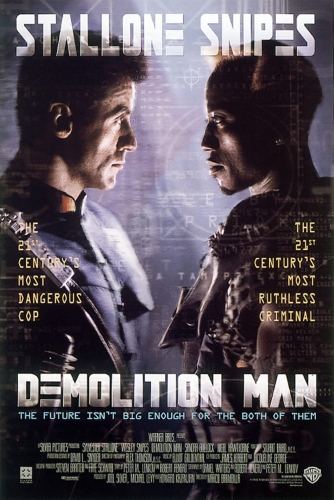
Demolition man : un film maudit et oublié, avec Stallone et Sandra Bullock, qui montre une société futuriste carrément eunuque, et dirigée suivant des règles presque brahmaniques par un gourou nommé Cocteau. Mais ce dernier veut renforcer son pouvoir et cela va causer sa perte. Les amendes pleuvent en cas de gros mots prononcés à haute voix et une puce injectée contrôle et situe chaque citoyen. Demolition man montre la dictature démocratique arrivée à son sommet dont l'UE est la pure émanation. Il lui manque (en eurovision) à organiser des chasses aux complotistes. On est sur la bonne voie (revoyez le Prix du danger de Boisset, adapté aux USA d'ailleurs – avec Schwarzenegger dans le rôle du gibier).
Hollywood peut se permettre ce type de film. Le public n'y voit que du feu. Et il est idiot d'ignorer cette évidence : le système n'a pas besoin d'avancer par énigmes. La masse étant aveugle, on n'a pas besoin de lui bander les yeux.
21:29 Publié dans Cinéma, Film | Lien permanent | Commentaires (0) | Tags : nicolas bonnal, cinéma, films, cinéma américain, hollywood |  |
|  del.icio.us |
del.icio.us |  |
|  Digg |
Digg | ![]() Facebook
Facebook
dimanche, 01 mai 2022
The Network et la vision du monde du capitalisme mondial
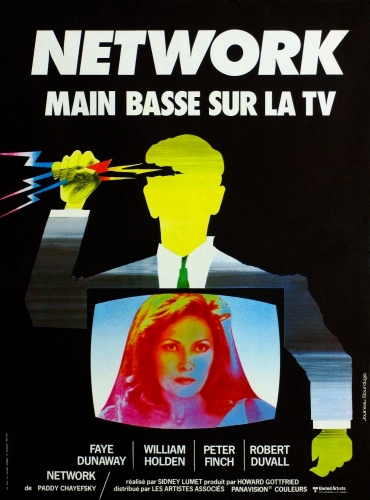
The Network et la vision du monde du capitalisme mondial
Markku Siira
Source: https://markkusiira.com/2022/04/30/the-network-ja-globaalikapitalismin-maailmankuva/
Le film The Network (1976) traite d'une chaîne de télévision fictive appelée UBS, qui diffuse n'importe quel programme sensationnaliste dans l'espoir d'attirer de larges audiences.
La meilleure partie de The Network est que le protagoniste capitaliste du film exprime l'extrémisme du pouvoir de l'argent, qui est habituellement adouci par l'utilisation d'un langage pseudo-humaniste.
Cette œuvre satirique est d'autant plus opportune que dans le monde en décomposition d'aujourd'hui, la place du cabinet et du capital est toujours dominée par la corporatocratie, le pouvoir corporatif des cosmopolites sans racines de Londres et de Washington dont le libéralisme économique toxique a pourri les sociétés ordonnées et ce, depuis les premières années de l'après-guerre.
Selon l'économiste Jeffrey Sachs, ce "pouvoir des entreprises" aux États-Unis peut être résumé en quatre groupes puissants: le "complexe militaro-industriel, le complexe Wall Street-Washington, le complexe pétrole-transport-militaire et le complexe des soins de santé".
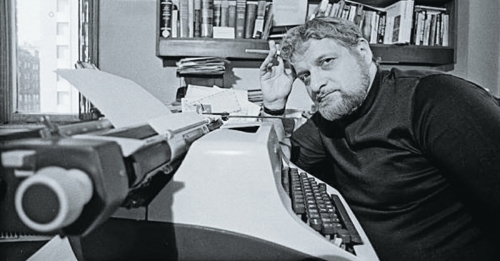
The Network est écrit par Paddy Chayefsky (photo) et réalisé par Sidney Lumet. Avec Faye Dunaway, William Holden, Peter Finch et Robert Duvall. Ned Beatty joue le rôle d'Arthur Jensen, qui est présenté dans cet article. Le film a remporté quatre Oscars, celui du meilleur acteur, de la meilleure actrice, du meilleur second rôle et du meilleur scénario original.
De manière significative, en 2000, la bibliothèque du Congrès américain a sélectionné le film pour le conserver dans le National Film Registry, une collection de films américains "culturellement, historiquement ou esthétiquement significatifs".
En 2005, deux Writers Guilds of America ont sélectionné le scénario de Chayefsky comme "l'un des dix meilleurs scénarios de l'histoire du cinéma". En 2007, le film a été classé 64ème parmi les 100 meilleurs films américains sélectionnés par l'American Film Institute.
Voici quelques-unes de mes citations préférées, librement traduites du film. Elles appartiennent à une scène dans laquelle le chef du réseau de télévision USB, le capitaliste et archi-mondialiste Arthur Jensen (Ned Beatty) explique au protagoniste, le présentateur de nouvelles congédié Howard Beale (Peter Finch), à quoi il pense que le monde ressemble. Même Beale, épuisé, a l'occasion de s'exprimer à la fin.
Présentant une vision du monde du capitalisme mondial, le discours brûlant de Jensen sonne de façon réaliste. Cet état de fait va-t-il changer ? Ces dernières années, l'élite financière a cherché non seulement à montrer sa force dans des circonstances exceptionnelles, mais aussi à ralentir le ralentissement économique que les milieux capitalistes ont eux-mêmes provoqué du fait de leur avidité.
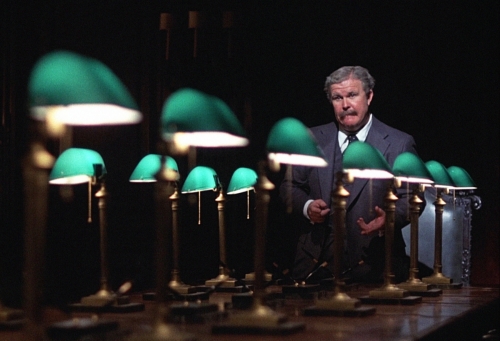
Lorsque l'argent et le pouvoir sont en jeu, le sort des États et des peuples n'a que peu d'importance. Voici un aperçu de l'esprit d'Arthur Jensen dans la fiction, mais aussi des capitalistes exploiteurs dans la vie réelle. Cette attitude technocratique de l'hégémon du dollar vous semble-t-elle familière ?
"Vous êtes un vieil homme qui pense encore en termes de nations et de peuples. Il n'y a pas de nations. Il n'y a pas de peuples. Il n'y a pas de Russes. Il n'y a pas d'Arabes. Il n'y a pas de tiers monde. Il n'y a pas d'Occident".
"Il n'y a qu'un seul système total de systèmes, un royaume vaste et entrelacé, interactif, multidimensionnel et multinational de dollars... Le système monétaire international détermine la totalité de la vie sur cette planète. C'est l'ordre naturel des choses aujourd'hui. C'est la structure atomique, subatomique et galactique des choses d'aujourd'hui !".
"Vous êtes assis devant votre petit écran de 21 pouces et vous hurlez sur l'Amérique et la démocratie. Il n'y a pas d'Amérique. Il n'y a pas de démocratie. Il n'y a que IBM, ITT, AT&T et DuPont, Dow, Union Carbide et Exxon. Ce sont les nations du monde d'aujourd'hui".
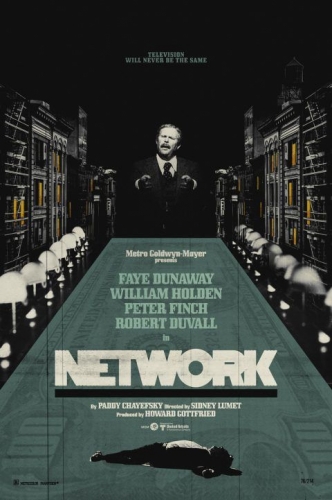
"A votre avis, de quoi parlent les Russes dans leurs conseils d'Etat? De Karl Marx ? Ils sortent leurs tableaux de programmation linéaire, leurs théories de décision statistique, leurs solutions minimax et calculent les probabilités de prix et les coûts de leurs transactions et investissements tout comme nous le faisons".
"Nous ne vivons plus dans un monde de nations et d'idéologies. Le monde est un collège de sociétés inexorablement régi par les règles immuables du commerce. Le monde est une entreprise. C'est le cas depuis que l'homme a rampé hors du monde primitif."
"Et nos enfants vivent pour le voir... un monde parfait... où il n'y a pas de guerres ou de famines, pas d'oppression ou de brutalité. Il n'y a qu'une seule grande société de gestion œcuménique, pour le profit commun de laquelle tous les hommes travaillent, et dans laquelle tous les hommes ont une part. Tous les besoins sont satisfaits, toutes les angoisses apaisées, tout l'ennui amusé."
Le propre discours d'Howard Beale à la télévision, prononcé par un présentateur de journal télévisé indigné, n'a pas suscité la sympathie des téléspectateurs. C'était trop sérieux, trop pessimiste, trop vrai. Suite à son discours, les notes ont chuté et il doit être remplacé par un nouvel employé. Mais ce que dit Beale reflète le présent et l'avenir.
"Je n'ai pas besoin de vous dire que les choses vont mal. Tout le monde sait que les choses vont mal. C'est la récession. Tout le monde est au chômage ou a peur de perdre son emploi. Le dollar a perdu un cinquième de sa valeur, les banques font faillite, les commerçants gardent une arme sous le comptoir. Les hooligans se déchaînent dans les rues, et personne ne semble savoir quoi faire, et il n'y a pas de fin en vue."
"Nous savons que l'air n'est pas bon à respirer et que la nourriture n'est pas bonne à manger. Nous sommes assis, le regard fixé sur la télévision, où un présentateur nous dit qu'il y a eu quinze homicides et soixante-trois crimes violents aujourd'hui, comme si c'était normal. Nous savons que les choses vont mal - pire que mal."
"Au plus profond de nos âmes terrifiées, nous savons que la démocratie est un géant mourant, un concept politique malade en phase terminale, en décomposition, se tordant dans ses derniers soupirs".
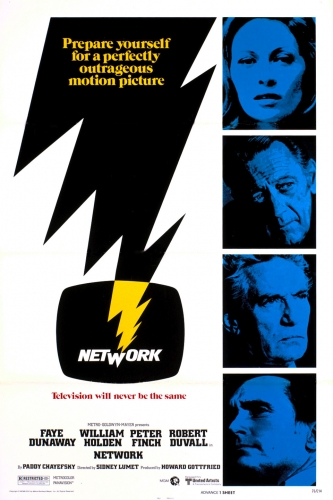
"Je ne dis pas que les États-Unis sont finis en tant que puissance mondiale. Les États-Unis sont le pays le plus riche, le plus puissant et le plus développé du monde, à des années-lumière de tout autre pays. Et je ne veux pas dire que les communistes prendront le contrôle du monde, car ils sont plus morts que nous".
"Ce qui a pris fin, c'est l'idée que ce grand pays est dédié à la liberté et à la prospérité de chaque individu. L'individu est parti. L'individu, l'homme solitaire a disparu. Chacun d'entre vous est parti parce que ce n'est plus une nation d'individus indépendants".
"Le moment est venu de se demander si la 'déshumanisation' est un si mauvais mot. Que ce soit bon ou mauvais, c'est comme ça. Nous sommes tous en train de devenir des humanoïdes, des androïdes qui ont l'air d'humains mais ne le sont pas. Des gens du monde entier, pas seulement nous [les Américains]. Nous sommes simplement le pays le plus avancé, donc nous sommes les premiers. Dans le monde entier, les gens deviennent des créatures produites en série, programmées, numérotées et insensibles".
21:02 Publié dans Cinéma, Film | Lien permanent | Commentaires (0) | Tags : cinéma, cinéma américain, the network, capitalisme |  |
|  del.icio.us |
del.icio.us |  |
|  Digg |
Digg | ![]() Facebook
Facebook
lundi, 06 janvier 2020
Conférence de Pierre Conesa : Le rôle du cinema américain dans la fabrication de l'ennemi
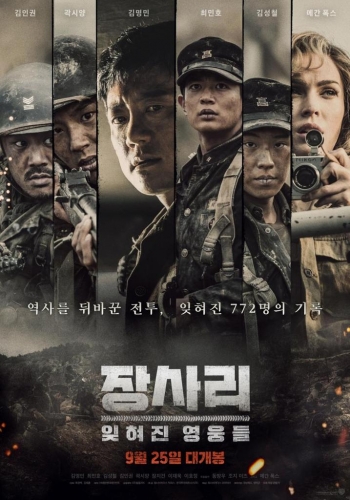
Conférence de Pierre Conesa : Le rôle du cinema américain dans la fabrication de l'ennemi
09:52 Publié dans Actualité, Cinéma, Manipulations médiatiques | Lien permanent | Commentaires (0) | Tags : hollywood, cinéma américain, cinéma, manipulations médiatiques |  |
|  del.icio.us |
del.icio.us |  |
|  Digg |
Digg | ![]() Facebook
Facebook
mardi, 17 mars 2015
War Porn
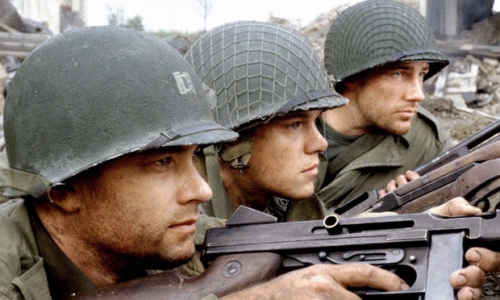
[Note for TomDispatch Readers: Just a small reminder that, in return for a donation of $100 or more to this site, you can choose between signed, personalized copies of two top-notch cultural histories of American war in our time: Christian Appy’s superb new book, American Reckoning: The Vietnam War and Our National Identity, and my own The End of Victory Culture. Just check out our donation page for details and for other book possibilities as well, including my new book Shadow Government: Surveillance, Secret Wars, and a Global Security State in a Single Superpower World. And remember that your donations really do keep this site rolling along! Tom]
Yes, they’ve become “the greatest generation” (a phrase that’s always reminded me of an ad line for a soft drink), but they didn’t feel that way at the time. As Susan Faludi pointed out in her classic book Stiffed and as I experienced as a boy, the men who came home from World War II were often remarkably silent about their wartime experiences -- at least with their children. My father, who had been the operations officer for the 1st Air Commando Group in Burma, had a couple of pat stories he would fall back on, if pressed, but normally only spoke of the war when angry. I can, for instance, remember him blowing up and forbidding my mother and me from using a nearby grocery store because, he claimed, its owners had been “war profiteers.” On rare occasions, he might pull out of the closet an old duffel bag filled with war souvenirs, including a Nazi armband (undoubtedly traded with someone who had been on the European front) and several glorious orange or white silk maps of Burma, assumedly meant to take up no space in a commando’s kitbag. These were thrilling moments of my childhood, though again my dad had little to say about what we looked at.
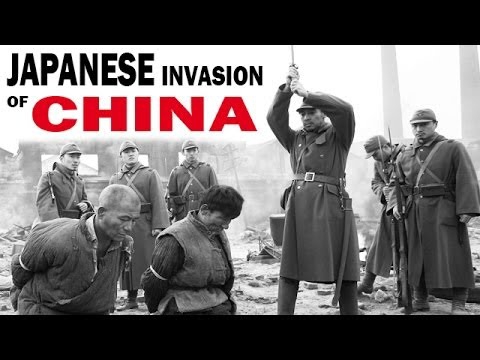 Otherwise, his war was a kind of black hole in family life. But for boys like me, that mattered less than you might expect for a simple reason: we already knew what our fathers had experienced at war. We had seen it at the movies, often with those fathers sitting silently beside us. We had seen John Wayne die on Iwo Jima and war hero Audie Murphy (playing himself) gun down the Germans. We had been with Doolittle’s Raiders over Tokyo for more than 30 seconds, had won back Burma, landed on Omaha beach, and fought island by island across the Pacific toward Japan. And of course, as our “victory culture” assured us we would, we had won.
Otherwise, his war was a kind of black hole in family life. But for boys like me, that mattered less than you might expect for a simple reason: we already knew what our fathers had experienced at war. We had seen it at the movies, often with those fathers sitting silently beside us. We had seen John Wayne die on Iwo Jima and war hero Audie Murphy (playing himself) gun down the Germans. We had been with Doolittle’s Raiders over Tokyo for more than 30 seconds, had won back Burma, landed on Omaha beach, and fought island by island across the Pacific toward Japan. And of course, as our “victory culture” assured us we would, we had won.
It’s hard to emphasize just how formative those war movies were for so many of us, especially if you add in the cheap, all-green sets of World War II toy soldiers with which we reenacted movie versions of our fathers’ war on our floors and, of course, the sticks, and later toy guns, with which we so gloriously shot down “Japs” and “Nazis” in any park or backyard. A whole generation of young Americans would go off to Vietnam stoked on John Wayne & Co. -- on a version of war, that is, that our fathers never told us hadn’t happened.
Ron Kovic, who came back from Vietnam in a wheelchair and wrote the memoir Born on the Fourth of July, recalled the experience vividly: "I think a lot of us went to Vietnam with movie images of John Wayne in our minds. On a reconnaissance patrol, I remember once imagining that I was John Wayne."
Today, former diplomat and whistleblower Peter Van Buren explores the way American war movies, from World War II to today, have produced a remarkably uniform vision of how American war works, one that, in its modern form, is undoubtedly once again lending a helping hand to our latest conflicts. In May 2011, Van Buren arrived at TomDispatch, just back from a 12-month State Department assignment in Iraq embedded with the U.S. military. In his first piece for this site, he reported on the heroic balderdash that embedded reporters -- think, for instance, of Brian Williams -- delivered to the American people about the U.S. military. It was, he wrote then, a kind of “war pornography.” (“Let me tell you that nobody laughed harder at the turgid prose reporters used to describe their lives than the soldiers themselves.”) So think of today’s piece, almost four years later, as a reprise on that theme with an embedded Hollywood stepping in to take the place of all the Brian Williamses of our world. Tom
War Porn
Hollywood and War from World War II to American Sniper
By Peter Van BurenIn the age of the all-volunteer military and an endless stream of war zone losses and ties, it can be hard to keep Homeland enthusiasm up for perpetual war. After all, you don't get a 9/11 every year to refresh those images of the barbarians at the airport departure gates. In the meantime, Americans are clearly finding it difficult to remain emotionally roiled up about our confusing wars in Syria and Iraq, the sputtering one in Afghanistan, and various raids, drone attacks, and minor conflicts elsewhere.
Fortunately, we have just the ticket, one that has been punched again and again for close to a century: Hollywood war movies (to which the Pentagon is always eager to lend a helping hand).American Sniper, which started out with the celebratory tagline “the most lethal sniper in U.S. history” and now has the tagline “the most successful war movie of all time,” is just the latest in a long line of films that have kept Americans on their war game. Think of them as war porn, meant to leave us perpetually hyped up. Now, grab some popcorn and settle back to enjoy the show.
There’s Only One War Movie
Wandering around YouTube recently, I stumbled across some good old government-issue propaganda. It was a video clearly meant to stir American emotions and prepare us for a long struggle against a determined, brutal, and barbaric enemy whose way of life is a challenge to the most basic American values. Here's some of what I learned: our enemy is engaged in a crusade against the West; wants to establish a world government and make all of us bow down before it; fights fanatically, beheads prisoners, and is willing to sacrifice the lives of its followers in inhuman suicide attacks. Though its weapons are modern, its thinking and beliefs are 2,000 years out of date and inscrutable to us.
Of course, you knew there was a trick coming, right? This little U.S. government-produced film wasn’t about the militants of the Islamic State. Made by the U.S. Navy in 1943, its subject was “Our Enemy the Japanese.” Substitute “radical Islam” for “emperor worship,” though, and it still makes a certain propagandistic sense. While the basics may be largely the same (us versus them, good versus evil), modern times do demand something slicker than the video equivalent of an old newsreel. The age of the Internet, with its short attention spans and heightened expectations of cheap thrills, calls for a higher class of war porn, but as with that 1943 film, it remains remarkable how familiar what’s being produced remains.
Like propaganda films and sexual pornography, Hollywood movies about America at war have changed remarkably little over the years. Here's the basic formula, from John Wayne in the World War II-era Sands of Iwo Jima to today's American Sniper:
*American soldiers are good, the enemy bad. Nearly every war movie is going to have a scene in which Americans label the enemy as “savages,” “barbarians,” or “bloodthirsty fanatics,” typically following a “sneak attack” or a suicide bombing. Our country’s goal is to liberate; the enemy's, to conquer. Such a framework prepares us to accept things that wouldn’t otherwise pass muster. Racism naturally gets a bye; as they once were “Japs” (not Japanese), they are now “hajjis” and “ragheads” (not Muslims or Iraqis). It’s beyond question that the ends justify just about any means we might use, from the nuclear obliteration of two cities of almost no military significance to the grimmest sort of torture. In this way, the war film long ago became a moral free-fire zone for its American characters.
*American soldiers believe in God and Country, in “something bigger than themselves,” in something “worth dying for,” but without ever becoming blindly attached to it. The enemy, on the other hand, is blindly devoted to a religion, political faith, or dictator, and it goes without saying (though it’s said) that his God -- whether an emperor, Communism, or Allah -- is evil. As one critic put it back in 2007 with just a tad of hyperbole, “In every movie Hollywood makes, every time an Arab utters the word Allah… something blows up.”
*War films spend no significant time on why those savages might be so intent on going after us. The purpose of American killing, however, is nearly always clearly defined. It's to “save American lives,” those over there and those who won’t die because we don't have to fight them over here. Saving such lives explains American war: in Kathryn Bigelow’s The Hurt Locker, for example, the main character defuses roadside bombs to make Iraq safer for other American soldiers. In the recent World War II-themed Fury, Brad Pitt similarly mows down ranks of Germans to save his comrades. Even torture is justified, as in Zero Dark Thirty, in the cause of saving our lives from their nightmarish schemes. In American Sniper, shooter Chris Kyle focuses on the many American lives he’s saved by shooting Iraqis; his PTSD is, in fact, caused by his having “failed” to have saved even more. Hey, when an American kills in war, he's the one who suffers the most, not that mutilated kid or his grieving mother -- I got nightmares, man! I still see their faces!
*Our soldiers are human beings with emotionally engaging backstories, sweet gals waiting at home, and promising lives ahead of them that might be cut tragically short by an enemy from the gates of hell. The bad guys lack such backstories. They are anonymous fanatics with neither a past worth mentioning nor a future worth imagining. This is usually pretty blunt stuff. Kyle’s nemesis in American Sniper, for instance, wears all black. Thanks to that, you know he’s an insta-villain without the need for further information. And speaking of lack of a backstory, he improbably appears in the film both in the Sunni city of Fallujah and in Sadr City, a Shia neighborhood in Baghdad, apparently so super-bad that his desire to kill Americans overcomes even Iraq's mad sectarianism.
*It is fashionable for our soldiers, having a kind of depth the enemy lacks, to express some regrets, a dollop of introspection, before (or after) they kill. In American Sniper, while back in the U.S. on leave, the protagonist expresses doubts about what he calls his “work.” (No such thoughts are in the book on which the film is based.) Of course, he then goes back to Iraq for three more tours and over two more hours of screen time to amass his 160 “confirmed kills.”
*Another staple of such films is the training montage. Can a young recruit make it? Often he is the Fat Kid who trims down to his killing weight, or the Skinny Kid who muscles up, or the Quiet Kid who emerges bloodthirsty. (This has been a trope of sexual porn films, too: the geeky looking guy, mocked by beautiful women, who turns out to be a superstar in bed.) The link, up front or implied, between sexuality, manhood, and war is a staple of the form. As part of the curious PTSD recovery plan he develops, for example, Kyle volunteers to teach a paraplegic vet in a wheelchair to snipe. After his first decent shot rings home, the man shouts, “I feel like I got my balls back!”
*Our soldiers, anguished souls that they are, have no responsibility for what they do once they’ve been thrown into our wars. No baby-killers need apply in support of America's post-Vietnam, guilt-free mantra, “Hate the war, love the warrior.” In the film First Blood, for example, John Rambo is a Vietnam veteran who returns home a broken man. He finds his war buddy dead from Agent Orange-induced cancer and is persecuted by the very Americans whose freedom he believed he had fought for. Because he was screwed over in The 'Nam, the film gives him a free pass for his homicidal acts, including a two-hour murderous rampage through a Washington State town. The audience is meant to see Rambo as a noble, sympathetic character. He returns for more personal redemption in later films to rescue American prisoners of war left behind in Southeast Asia.
*For war films, ambiguity is a dirty word. Americans always win, even when they lose in an era in which, out in the world, the losses are piling up. And a win is a win, even when its essence is one-sided bullying as in Heartbreak Ridge, the only movie to come out of the ludicrous invasion of Grenada. And a loss is still a win in Black Hawk Down, set amid the disaster of Somalia, which ends with scenes of tired warriors who did the right thing. Argo -- consider it honorary war porn --reduces the debacle of years of U.S. meddling in Iran to a high-fiving hostage rescue. All it takes these days to turn a loss into a win is to zoom in tight enough to ignore defeat. In American Sniper, the disastrous occupation of Iraq is shoved offstage so that more Iraqis can die in Kyle’s sniper scope. In Lone Survivor, a small American “victory” is somehow dredged out of hopeless Afghanistan because an Afghan man takes a break from being droned to save the life of a SEAL.
In sum: gritty, brave, selfless men, stoic women waiting at home, noble wounded warriors, just causes, and the necessity of saving American lives. Against such a lineup, the savage enemy is a crew of sitting ducks who deserve to die. Everything else is just music, narration, and special effects. War pornos, like their oversexed cousins, are all the same movie.
A Fantasy That Can Change Reality
But it's just a movie, right? Your favorite shoot-em-up makes no claims to being a documentary. We all know one American can't gun down 50 bad guys and walk away unscathed, in the same way he can't bed 50 partners without getting an STD. It's just entertainment. So what?
So what do you, or the typical 18-year-old considering military service, actually know about war on entering that movie theater? Don’t underestimate the degree to which such films can help create broad perceptions of what war’s all about and what kind of people fight it. Those lurid on-screen images, updated and reused so repetitively for so many decades, do help create a self-reinforcing, common understanding of what happens “over there,” particularly since what we are shown mirrors what most of us want to believe anyway.
No form of porn is about reality, of course, but that doesn’t mean it can’t create realities all its own. War films have the ability to bring home emotionally a glorious fantasy of America at war, no matter how grim or gritty any of these films may look. War porn can make a young man willing to die before he’s 20. Take my word for it: as a diplomat in Iraq I met young people in uniform suffering from the effects of all this. Such films also make it easier for politicians to sweet talk the public into supporting conflict after conflict, even as sons and daughters continue to return home damaged or dead and despite the country’s near-complete record of geopolitical failures since September 2001. Funny thing: American Sniper was nominated for an Academy Award for best picture as Washington went back to war in Iraq in what you'd have thought would be an unpopular struggle.
Learning From the Exceptions
You can see a lot of war porn and stop with just your toes in the water, thinking you've gone swimming. But eventually you should go into the deep water of the “exceptions,” because only there can you confront the real monsters.
There are indeed exceptions to war porn, but don’t fool yourself, size matters. How many people have seen American Sniper, The Hurt Locker, or Zero Dark Thirty? By comparison, how many saw the anti-war Iraq War film Battle for Haditha, a lightly fictionalized, deeply unsettling drama about an American massacre of innocent men, women, and children in retaliation for a roadside bomb blast?
Timing matters, too, when it comes to the few mainstream exceptions. John Wayne’s The Green Berets, a pro-Vietnam War film, came out in 1968 as that conflict was nearing its bloody peak and resistance at home was growing. (The Green Berets gets a porn bonus star, as the grizzled Wayne persuades a lefty journalist to alter his negative views on the war.) Platoon, with its message of waste and absurdity, had to wait until 1986, more than a decade after the war ended.
In propaganda terms, think of this as controlling the narrative. One version of events dominates all others and creates a reality others can only scramble to refute. The exceptions do, however, reveal much about what we don’t normally see of the true nature of American war. They are uncomfortable for any of us to watch, as well as for military recruiters, parents sending a child off to war, and politicians trolling for public support for the next crusade.
War is not a two-hour-and-12-minute hard-on. War is what happens when the rules break down and, as fear displaces reason, nothing too terrible is a surprise. The real secret of war for those who experience it isn't the visceral knowledge that people can be filthy and horrible, but that you, too, can be filthy and horrible. You don't see much of that on the big screen.
The Long Con
Of course, there are elements of “nothing new” here. The Romans undoubtedly had their version of war porn that involved mocking the Gauls as sub-humans. Yet in twenty-first-century America, where wars are undeclared and Washington dependent on volunteers for its new foreign legion, the need to keep the public engaged and filled with fear over our enemies is perhaps more acute than ever.
So here’s a question: if the core propaganda messages the U.S. government promoted during World War II are nearly identical to those pushed out today about the Islamic State, and if Hollywood’s war films, themselves a particularly high-class form of propaganda, have promoted the same false images of Americans in conflict from 1941 to the present day, what does that tell us? Is it that our varied enemies across nearly three-quarters of a century of conflict are always unbelievably alike, or is it that when America needs a villain, it always goes to the same script?
Peter Van Buren blew the whistle on State Department waste and mismanagement during the Iraqi reconstruction in his first book,We Meant Well: How I Helped Lose the Battle for the Hearts and Minds of the Iraqi People. A Tom Dispatch regular, he writes about current events at his blog, We Meant Well. His latest book isGhosts of Tom Joad: A Story of the #99Percent.
Follow TomDispatch on Twitter and join us on Facebook. Check out the newest Dispatch Book, Rebecca Solnit's Men Explain Things to Me, and Tom Engelhardt's latest book, Shadow Government: Surveillance, Secret Wars, and a Global Security State in a Single-Superpower World.
Copyright 2015 Peter Van Buren
00:05 Publié dans Cinéma, Film | Lien permanent | Commentaires (0) | Tags : hollywood, cinéma, cinéma américain, états-unis, 7ème art |  |
|  del.icio.us |
del.icio.us |  |
|  Digg |
Digg | ![]() Facebook
Facebook



